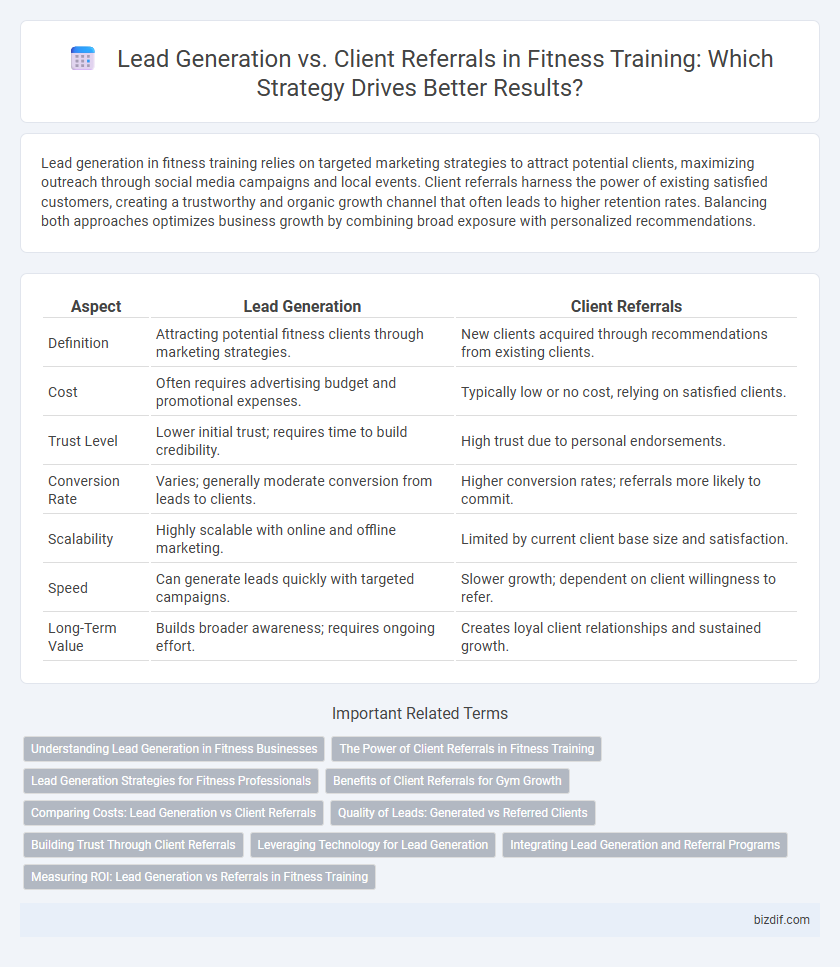Lead generation in fitness training relies on targeted marketing strategies to attract potential clients, maximizing outreach through social media campaigns and local events. Client referrals harness the power of existing satisfied customers, creating a trustworthy and organic growth channel that often leads to higher retention rates. Balancing both approaches optimizes business growth by combining broad exposure with personalized recommendations.
Table of Comparison
| Aspect | Lead Generation | Client Referrals |
|---|---|---|
| Definition | Attracting potential fitness clients through marketing strategies. | New clients acquired through recommendations from existing clients. |
| Cost | Often requires advertising budget and promotional expenses. | Typically low or no cost, relying on satisfied clients. |
| Trust Level | Lower initial trust; requires time to build credibility. | High trust due to personal endorsements. |
| Conversion Rate | Varies; generally moderate conversion from leads to clients. | Higher conversion rates; referrals more likely to commit. |
| Scalability | Highly scalable with online and offline marketing. | Limited by current client base size and satisfaction. |
| Speed | Can generate leads quickly with targeted campaigns. | Slower growth; dependent on client willingness to refer. |
| Long-Term Value | Builds broader awareness; requires ongoing effort. | Creates loyal client relationships and sustained growth. |
Understanding Lead Generation in Fitness Businesses
Lead generation in fitness businesses involves attracting potential clients through targeted marketing strategies such as social media campaigns, SEO optimization, and lead magnets like free trials or workouts. Effective lead generation focuses on capturing contact information and nurturing prospects through personalized communication to convert them into paying clients. Utilizing customer relationship management (CRM) systems enhances tracking and follow-up processes, ultimately boosting client acquisition rates in competitive fitness markets.
The Power of Client Referrals in Fitness Training
Client referrals in fitness training generate high-quality leads with increased trust and conversion rates compared to traditional lead generation methods. Referred clients are more likely to commit to long-term training programs due to the personalized experience shared by the referrer. Leveraging satisfied clients as brand ambassadors significantly reduces marketing costs while enhancing business growth and reputation in competitive fitness markets.
Lead Generation Strategies for Fitness Professionals
Effective lead generation strategies for fitness professionals include leveraging social media advertising, creating engaging content such as workout videos and nutritional tips, and optimizing local SEO to attract nearby clients. Implementing targeted email campaigns and offering free trials or fitness assessments can also increase potential client interest and conversion rates. Utilizing fitness apps and online booking systems streamlines client onboarding and enhances lead capture efficiency.
Benefits of Client Referrals for Gym Growth
Client referrals significantly boost gym growth by leveraging trusted relationships that result in higher-quality leads and increased member retention rates. Referred clients often exhibit stronger commitment and longer membership durations, reducing marketing costs and enhancing overall revenue stability. This organic growth strategy amplifies brand credibility and fosters a supportive community environment critical for sustained fitness business success.
Comparing Costs: Lead Generation vs Client Referrals
Lead generation in fitness training often incurs higher costs due to expenses in digital marketing, paid ads, and lead management software, averaging $50 to $200 per lead. In contrast, client referrals typically cost significantly less, primarily involving incentives or rewards, making them a more cost-effective strategy with acquisition costs as low as $10 to $30 per referral. Evaluating the return on investment reveals that referrals not only reduce costs but also yield higher client retention rates and long-term loyalty compared to traditional lead generation methods.
Quality of Leads: Generated vs Referred Clients
Referred clients in fitness training often exhibit higher commitment and retention rates due to established trust and personal recommendations, leading to superior lead quality. Generated leads require more nurturing and qualification, as they are generally less familiar with the trainer's expertise and services. Prioritizing client referrals can enhance the fitness business's conversion rates and long-term client satisfaction compared to conventional lead generation methods.
Building Trust Through Client Referrals
Client referrals generate higher trust and conversion rates in fitness training by leveraging existing clients' positive experiences as social proof. Personalized success stories and consistent, high-quality coaching create authentic relationships that encourage word-of-mouth recommendations. This organic trust outperforms lead generation methods relying solely on advertising and outreach, driving sustainable business growth.
Leveraging Technology for Lead Generation
Leveraging technology for lead generation in fitness training enhances targeted marketing through data-driven platforms like social media ads and email automation. Utilizing customer relationship management (CRM) systems streamlines follow-ups and personalizes communication, increasing conversion rates from prospects to clients. Integrating AI-powered analytics identifies high-potential leads, optimizing recruitment efforts compared to relying solely on client referrals.
Integrating Lead Generation and Referral Programs
Integrating lead generation and client referral programs multiplies outreach by targeting both new prospects and existing satisfied clients, enhancing overall client acquisition. Leveraging digital marketing tools with referral incentives creates a seamless funnel that drives qualified leads while rewarding loyal customers. This dual approach optimizes fitness training business growth by balancing proactive outreach with organic word-of-mouth promotion.
Measuring ROI: Lead Generation vs Referrals in Fitness Training
Measuring ROI in fitness training reveals that lead generation efforts often incur higher upfront costs with variable conversion rates, while client referrals typically yield a higher return on investment due to lower acquisition costs and increased trust. Referral programs in fitness businesses show a 3.5x better retention rate and a 4x higher lifetime value compared to leads generated through paid marketing channels. Tracking metrics such as cost per acquisition, conversion rates, and client lifetime value provides a clear comparison for optimizing marketing spend between lead generation and referral strategies.
Lead Generation vs Client Referrals Infographic

 bizdif.com
bizdif.com